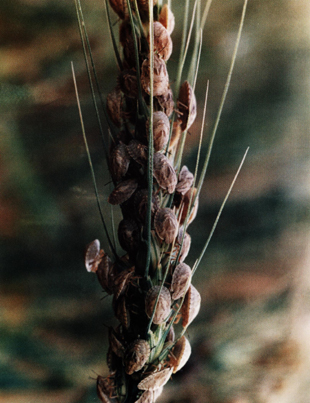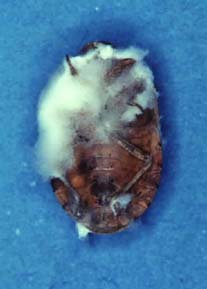
Helmand Wheat Crop Saved from Sunn Pest Infestation
Using Sunn pest management information provided by ICARDA, the Central Asia Development Group (CADG) was able to save approximately 12.8 million dollars worth of wheat in Helmand Province of Afghanistan. According to Steve Shaulis, director of CADG, "we launched an emergency program with our extension workers, supported by community volunteers, and our program covered 32,000 acres in around 7 days." The Sunn pest infestation was effectively controlled.
 |
|
Heavy Sunn pest infestation on a wheat spike
|
It is estimated that over 200,000 hectares of irrigated wheat production in
Afghanistan was rendered unusable after being infested by Sunn pest (Eurygaster
integriceps) in 2002. Along with the evolution of many of the world's most important
crops, the Middle East and West Asia also host many of wheat and barley's most
damaging pests. Heavy Sunn pest infestation on a wheat spike Sunn pest damages
crops by feeding on the plants and by injecting chemicals that cause the grain's
gluten to break down. If as little as 2 or 3% of the grain in a crop has been
affected, the grain is unusable for baking.
The control of Sunn pest in Helmand was achieved by using specific quantities of recommended pesticides. For long-term management solutions, training will be provided in Integrated Pest Management in Kabul in August of 2003. As part of the short-term, high impact grant projects in Afghanistan, ICARDA scientist, Dr. Mustapha El Bouhssini is working with Dr. Bruce Parker and Dr. Margaret Skinner of the University of Vermont. This effort is funded by USAID.
The effectiveness of the integrated pest management (IPM) approach has already been demonstrated in Iran. It calls upon comprehensive biological and behavioral knowledge of the insect, the natural enemies of Sunn pest, farming practices, host plant resistance, and entomopathogenic fungi as well as conventional use of pesticides to combat infestations and the damage to crops. By using this approach, scientists hope to more effectively control infestations and decrease dependence on expensive and environmentally harmful chemicals that may also create resistance in the insect population.
Publications on Sunn pest control - a brochure, training manual and an Insect Field Guide - are being translated into Pashto and Dari and will be made available in Afghanistan this summer. The equipment and library for an Integrated Pest Management Lab has been ordered and is to be installed in Kabul with cooperation from the Ministry of Agriculture and Livestock. Twenty Afghan plant protectionists and agronomists, including representatives from CADG, have been selected for the summer IPM training. In addition, 10 Afghan plant protectionists will be coming to ICARDA for a three-week training on IPM of Sunn pest 15 May-4 June, 2003. The training program will cover basic research on the different IPM components conducted at ICARDA (host plant resistance, entomopathogenic fungi, parasitoids) and field visits to Sunn pest IPM pilot sites where farmers field schools have been established in Syria and Turkey.
The IPM Approach
Trainees will learn how to conduct field assessments, which are necessary to
reveal the degree of infestation and overwintering sites where Sunn Pest can
be controlled before migrating to crop areas in the spring. By training plant
protectionists, extensionists and farmers to identify these overwintering sites,
they can calculate the likelihood of infestation, and learn how to determine
the economic threshold in the field for application of pesticides or utilize
other methods for controlling the insects before they cause crop damage.
The sex pheromones of Sunn pest have been isolated by CABI Bioscience and are being synthesized. By applying the synthesized pheromones at the appropriate time in the insect's life-cycle, mating can be disrupted.
 |
|
Sunn Pest adult infected with Beauveria bassiana
|
As another option, the fungus species "Beauveria bassiana," is being developed as a possible biocontrol agent. Scientists have determined that this fungus is highly toxic to Sunn pest in the l adult stage. When mass-produced on cereal grain and applied by farmers to Sunn pest overwintering sites, this fungal formulation will be low-cost and simple to apply.
ICARDA scientists have already discovered a source of resistance to Sunn pest in a wild relative of wheat. Plant breeders are crossing these lines with Afghanistan-adapted bread wheat varieties in an effort to develop crops for release to farmers in regions infested with this destructive insect.
With training in Integrated Pest Management, farmers can rely on less toxic,
less expensive measures to control this destructive crop pest. In the future,
dependence on government-funded pesticides will diminish along with the Sunn
Pest adult infected with
damage caused to the environment. Afghan farmers will Beauveria bassiana
soon have access to safer, healthier and more effective means of protecting
their crops.